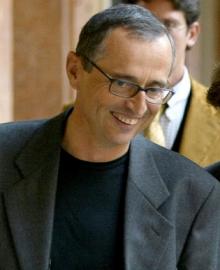I’ve been getting a bunch of emails and comments here about the Omega Pharma-QuickStep team doctor, Jose Ibarguren Taus, and how it seems pretty fishy that as he moves around the professional cycling ranks, the teams that he works for seem to excel. I have to admit, it seems screwy.
But, I don’t think I can’t go to the extent and say that there isn’t a need for team doctors in professional cycling. I just don’t like it that the doctors travel around with the teams at the races.
Someone posed a question a few days ago about even the BMC team has 6 doctors. I understand that seems like a lot, but none of these doctors work exclusively for the BMC team. They all have their own practices and “moonlight” working bicycle races. I know 3 of the doctors personally. I’ve know Max and Eric Heiden for decades. Eric is an orthopedic surgeon and fixes the riders when they are broken. Max does all the physiological testing on the team. They do switch off turns going and working races throughout the year. If I ran a professional team, I’d make it a priority to have a good medical staff.
What I see as screwed up in the system is when the doctor’s sole employment is traveling around with a team. I think that at the races, the riders need to see the race doctors, not their personal team doctors. I don’t think that team doctors have any place at a race.
In the case of Dr. Jose Ibarguren Taus, I don’t understand why he is even allowed near a bike race team. He is involved in the Mantova doping scandal, and has been summoned to testify at a hearing in July. He has got a pretty dark background, at least circumstantially, and has no business being employed by Tom Boonen’s team.
It is much like when the unofficial “war” started between Greg LeMond and Lance Armstrong. Lance was working with Dr. Ferrari and the good doctor made some asinine statement saying the EPO was no more dangerous than orange juice. Greg did an interview with USA today and said that with all the doping and corruption in the sport of cycling, that Lance needed to separate himself from a guy that would say that. That was the first shot of a never ending war. Lance officially separated himself from Dr. Ferrari, but I guess he kept sending him money for some reason.
I agree with the premise though. The sport has too many problems with doping and such that there can’t be doctors involved that aren’t squeaky clean. It leaves too much room to speculate and question. And we do that enough already way too much.






Agree completely. I dont care if one wants to make this his total gig, there are a ton of reasons for that, most of which would be benign and for pure enjoyment or retirement type stuff.
As far as shady ones go, I dont think there is any reason at all for them to be any closer than an online stream to cycling. There are simply way to many doctors to justify it. Its not like its rocket science or some foreign tricky thing, the experience card really only brings up thoughts of experience with the darker arts.
Even if for some reason they were clean and squeaky, heresy/circumstantial evidence, and the litany of replacements that could replace them without a missed beat (assuming your running clean) are way too strong to justify having them around.
Steve, I respect your opinion, but if it were me, I’d much rather see the doctor who knows me, my body, and my symptoms, than some other doctor(s) randomly assigned by a race director or the UCI. Seeing a doctor who wouldn’t know any of my medical history doesn’t seem like good medicine to me. And if I’m running a cycling team, where the health of the riders is paramount, there’s no way I’m trusting someone that I don’t know with my team’s health. Finally, from a legal perspective, I don’t see how on earth you could prohibit someone from seeing the doctor of their choice. That seems more than a little draconian. Just because some team doctors (perhaps many) have behaved badly in the past is no reason to prohibit team doctors today from practicing their profession. If we were to follow that logic completely, there’d be no racing at all.
Why do you think his statement about EPO & OJ was asinine? From what I could tell with some quick research, EPO is NOT dangerous.
I am in NO WAY in favor of drug cheats in sports but it doesn’t seem to be a “dangerous” drug.
Tainted Glory – Doping and Athletic Performance. Noakes, TD. New England JMed. 351:9. Aug.26. 2004
“Why is EPO dangerous?
The reason that EPO, and transfusion blood doping, is dangerous is because of increased blood viscosity. Basically, whole blood consists of red blood cells and plasma (water, proteins, etc.). The percentage of whole blood that is occupied by the red blood cells is referred to as, the hematocrit. A low hematocrit means dilute (thin) blood, and a high hematocrit mean concentrated (thick) blood. Above a certain hematocrit level whole blood can sludge and clog capillaries. If this happens in the brain it results in a stroke. In the heart, a heart attack. Unfortunately, this has happened to several elite athletes who have used EPO.
EPO use is especially dangerous to athletes who exercise over prolonged periods. A well-conditioned endurance athlete is more dehydration resistant than a sedentary individual. The body accomplishes this by several methods, but one key component is to “hold on” to more water at rest. Circulating whole blood is one location in which this occurs and, thus, can function as a water reservoir. During demanding exercise, as fluid losses mount, water is shifted out of the blood stream (hematocrit rises). If one is already starting with an artificially elevated hematocrit then you can begin to see the problem — it is a short trip to the critical “sludge zone”.
Additional dangers of EPO include sudden death during sleep, which has killed approximately 18 pro cyclists in the past fifteen years, and the development of antibodies directed against EPO. In this later circumstance the individual develops anemia as a result of the body’s reaction against repeated EPO injections.”
EPO not dangerous? Are you serious, even tylenol has its dangers.
As far as the team not needing their own personal doctors…I dont see an ethical issue if only clean doctors were used at all. However, on a cost/scale issue, its simply unnecessary to have a doctor to each team at a race. They are for the most part going unused and an unnecessary cost.
As for wanting your own doctor that knows you, etc…that sounds great, but the issues arising at a race just dont require that kind of intimate relationship. Remember these are healthy individuals. Broken clavicle, sling and off to hospital. Same goes for almost anything else that might occur. If you get severely injured, none of that stuff matters, the basics will save you, not the knowledge that your grandfather died of rheumatic fever.
This could save a lot of money.
Logistically, I don’t see how this “see the race doctor” setup would work. Rarely are all the cycling teams housed in a single hotel (even in the major U.S. races). So each race is going to have to ring up six of its own doctors to go around and make more than a 120 “house calls” in hotel rooms scattered across what could be a fairly large geographical area. At the Vuelta a España last year, some teams were housed more than an hour apart from each other.
We’re talking about Western Europe here, not the wilds of West Africa. All of these countries have fairly decent health care systems which can take care of routine as well as emergency cases. As for Spain: http://www.npr.org/templates/story/story.php?storyId=112014770 “Spain’s single-payer health care system is ranked seventh best in the world by the World Health Organization. The system offers universal coverage as a constitutionally-guaranteed right and no out-of-pocket expenses — aside from prescription drugs.”
Just in the face if it, the team is called “OMEGA PHARMA”. . . . Really?
Spain’s healthcare is not that great, if being a professional cyclist and getting essentially zero treatment and no diagnosis is great. When leipheimer crashed they didn’t even X-ray him or give him much of anything, they thought it was because of the financial crisis…scary.
It was on velonews, they just shipped him back home. That’s the treatment a professional sports figure got.